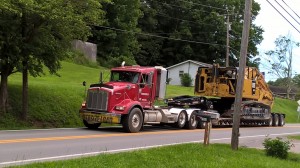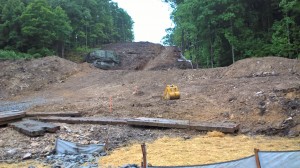By: Katie Kuba, The Buckhannon Record Delta, June 11, 2018
BUCKHANNON — The state policy director for Dominion Energy on Thursday pledged to examine whether vehicles associated with Atlantic Coast Pipeline construction were in compliance with weight limits the West Virginia Department of Highways has set for bridges.
In response to a handful of concerns raised by two members of Mountain Lakes Preservation Alliance — April Pierson-Keating and Tim Higgins — Bob Ordorff said he would make contact with the W.Va. DOH to ensure Dominion Energy, the primary operator of the 600-mile-long, 42-inch-wide natural gas pipeline, was operating in accordance with the weight limits of bridges on rural roads, many of which are unlisted.
The concern came up at Thursday’s Upshur County Commission meeting when Keating presented a slideshow of a various images of ACP construction in the county, including pictures of large tanker trucks and semi trucks crossing bridges on back roads.
“I’ve been kind of keeping an eye on the construction activities,” Keating told the commission, as well as Orndorff and ACP community liaison Mike Cozad, both of whom attended Thursdays meeting. “This bridge here does not have a sign for weight limits, and I talked to the bridge engineer for state roads, who said bridges on the back roads are [designed to hold] 65,000 pounds, and I’m not sure what the weight is on these trucks, but there are two of them on the bridge at the time.”
“I’m concerned about the bridge,” Keating said, referencing a bridge in the Sago Road area. “There is no weight limit sign on the bridge … As a bridge gets older and breaks down, it’s going to be less able to handle great amounts of weight.”
Orndorff said he would meet with ACP/Dominion’s permitting team and check into whether the company and its contractors were adhering to weight limits. “One of the takeaways I have is, we’re going to look at those bridges,” Orndorff said. “We have committed to operating this project safely, and if we’re operating in an unsafe fashion, we will correct the problem. We will look at the bridges.”
Keating raised several other concerns, including the fear that the jobs produced by the pipeline project were all going to out-of-state residents.
Referring to a picture of a large semi truck turning onto the Sago Road, Keating said, “One of the trucks, as you can see, does not have a West Virginia plate, and this is pretty common. One of the biggest carrots that we were dangled for this project was the prospect of jobs for local people, and it doesn’t look to me like there’s a whole lot.”
Keating said she was also concerned about the felling of trees causing too much sediment to wash into the Buckhannon River. “Anytime you expose a whole bunch of soil like this, you’re going to have a lot of runoff [into local waterways],” she said.
Additionally, Keating said she wanted to highlight the RV camp that’s been constructed across from the 40-acre construction/pipeline yard on the Brushy Fork Road. “Another problem that I wanted to highlight is that there is a man camp that has gone in across from the [contractor/pipeyard on Brushy Fork Road] and it has over 100 slots,” she said. “There’s even some houses there, or trailers, doublewides. It’s pretty extensive.”
Orndorff said the area wasn’t a typical man camp, which is self-sufficient in that it includes a cafeteria to serve residents. “That is not a man camp, that is an RV site,” Orndorff said. “A man camp is self-sufficient — has a cafeteria — so again some misinformation has been provided to the commission.”
Keating said she was ultimately advocating for the future health of residents as well as the local economy.
“The question that I come to you with today is, where are all those jobs that were promised?” she asked. “How many locals were actually hired, and I mean actual residents, people who have lived here for six months or more. As I’ve pointed out before, there have been reports that have shown there’s no need for this gas. None of it goes to West Virginia, and we bear the brunt of the pipeline construction and more fracking as a result.”
Commissioner Terry Cutright countered that ACP/Dominion would not be able to sell a product for which there was no demand. “You can’t sell something that there’s no need for,” he said.
Keating said the demand for natural gas had been manufactured. “The demand has been manufactured,” she said. “We have enough gas in storage to last us until 2030. Solar is the direction everyone is going in, so basically, we’re in a changing world. The millennials do not want fossil fuels.
“The millennials are coming out against it. The Poor People’s Campaign has come out against fossil fuels. Basically, everybody — environmentalists, businesspeople, veterans, children and retirees — all want, need and deserve renewable energy and a future they can rely on to be healthy, happy and productive.”
Orndorff responded to Keating’s statements about the percentage of jobs being given to local workers.
“There seems to be a lot of speculation, a lot of ‘what ifs’ and it’s hard to respond to that,” he said. “Right now on the job, of the operators that are operating equipment, 41 out of 75 apparently are local workers. Of the teamsters, 12 out of 20 are local workers. Of the laborers, are way over 50 percent. We made a commitment when we started this project that all the hires — the new hires on this project — would be 50 percent [local people], and we’re following that at this point in time.”
Following the commission meeting, Cozad said he expected the RV camp to be fully occupied sometime in August.


